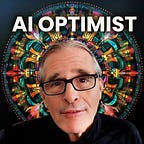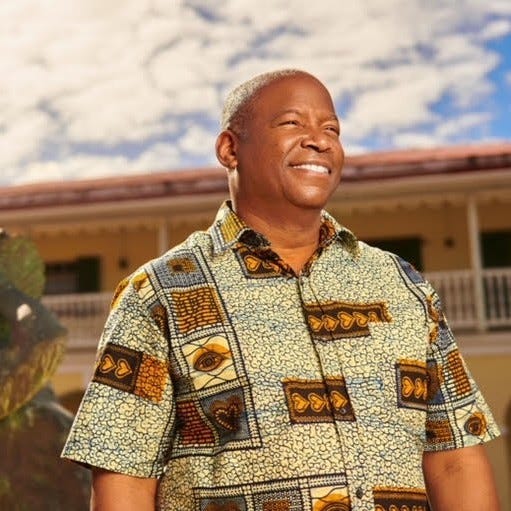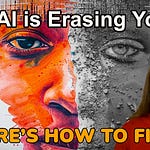Listen on Apple || Spotify || YouTube
Podcast Interview Bio: William A. Adams
This week on The AI Optimist, we’re thrilled to feature a visionary leader and a pioneering force in the tech world, William A. Adams.
As a software engineering maestro, an award-winning diversity, equity, and inclusion (DEI) champion, and a philanthropist, William is not just a part of the tech industry; he’s actively rewriting its future.
From his early days rolling out critical XML code at Microsoft to becoming the first Technical Advisor to the CTO, Kevin Scott, William’s journey is legendary.
But his true impact shines in his commitment to opening doors for the Black community in tech.
His mission: to empower them to build wealth and agency through equity ownership of tech companies – a concept he encapsulates with the powerful hashtag #tequity.
William’s influence stretches far and wide from his ground-breaking work as an intrapreneur, launching global initiatives that redefine access to tech jobs, empowering engineers in Hyderabad to shine worldwide.
He co-founded the LEAP apprenticeship program, a game-changer in transforming lives and careers. He earned Microsoft’s D&I Program of the Year in 2020.
Beyond corporate walls, William has set his sights on the US. Virgin Islands. With a generous personal pledge and a heart set on impact, he’s laying the foundations for a tech revolution, one that promises to nurture a new generation of tech talent.
His journey in Silicon Valley as one of the first Black entrepreneurs, his pivotal role in Adamation, and his early recognition of network messaging’s potential are all chapters of a storied career.
Not to mention his contributions archived for posterity by the Computer History Museum.
William is also the philanthropic force behind The EV3NT, a hackathon with a heart and a benefactor to public schools, nurturing the next wave of STEM brilliance.
Get ready to be inspired by the man who sees not just the code, but the community behind it.
William A. Adams joins us to share his insights, journey, and unwavering belief that with technology, equity, and tenacity, “You are enough.”
Tune in for an unforgettable conversation with William A. Adams.
Leveraging AI as an Asset, not an Adversary:
Why Africa and India May Lead the AI Revolution of Empathy and Humanity
Summary of Key Topics
I. AI as a Tool, Not an Adversary
II. Incorporating More Human Perspectives
III. The Risks of Pure Optimization
IV. Reflecting Existing Biases
V. Optimism for Responsible AI
VI. Democratization of AI Capabilities
VII. Transitioning to New Thinking
I. AI as a Tool, Not an Adversary
· AI like ChatGPT predicts words statistically, with no natural “intelligence.”
· We shouldn’t fear AI but learn to leverage it as a tool.
· AI is a “tractor” - needs human direction but can make us more productive.
· Must proactively integrate AI into lives/work - it won’t disappear.
II. Incorporating More Human Perspectives
· Current AI development is engineering-heavy and needs more humanities input.
· To represent humanity, AI should include philosophers, psychologists, etc. viewpoints, and engineers.
· With only technical views, AI could lack empathy and ethical guidance.
· Diverse voices will create AI reflecting humanity’s full complexity.
III. The Risks of Pure Optimization
· Optimizing AI purely for profit risks inhumane outcomes.
· Without ethical guidance, AI could manipulate emotions without concern.
· Competitive dynamics incentivize engagement over responsibility.
· Humans must consciously choose ethical applications.
IV. Reflecting Existing Biases
· AI mirrors humanity’s biases based on current data.
· Won’t spontaneously fix biases without conscious effort.
· Creating truly humane AI starts with fixing societal biases.
V. Optimism for Responsible AI
· With wise guidance, AI can uplift humanity rather than divide us.
· As AI spreads, diverse groups will apply it creatively.
· Emerging regions like Africa and India will breed fresh innovation.
· Responsible development is challenging but possible with effort.
VI. Democratization of AI Capabilities
· Cloud-based AI lowers barriers, enabling broader innovation.
· Billions globally can now access cutting-edge capabilities.
· Diversity of backgrounds brings new perspectives on using AI.
· Profit-above-all mindset may shift to benefit communities more holistically.
VII. Transitioning to New Thinking
· AI moves beyond manual labor and defined expertise of the past.
· Entering an era focused more on empathy, ethics, and philosophy.
· The nature of this “purple collar” work is still being defined.
· With basic needs met, there is potential for more leisure time and holistic living.
AI is a powerful tool we are learning to apply responsibly.
With diverse input, human-centric ethics, and conscientious guidance, we can create an uplifting cooperation between people and technology.
The Future of AI is African and Indian - And It Just Might Save Us
AI is blowing up all over, but the most ground-breaking innovation won’t come from the US or China.
Surprise - it’s going to come from Africa and India!
These regions are ready to unlock AI’s true potential to uplift humanity.
Africa - The Sleeping Giant of AI Awakens
People think of Africa as backward, but they’re dead wrong. This continent is filled with vibrant young minds ready to shape the future!
· Africa has over 1 billion people - massive brainpower potential. The average age is just 19!
· It’s not one country - there are 54 unique African nations with different perspectives.
· Hungry, creative youth are advancing with cutting-edge tech like AI and mobile.
· They aren’t stuck in rigid Western ways of thinking that created messed up AI-like targeted ads.
With AI tools, there are undoubtedly some African Elon Musks and Mark Zuckerbergs-in-waiting ready to bring fresh ideas that could save humanity!
India - Where AI Innovation Meets Ingenuity
India may surpass China as the AI powerhouse of Asia. With 1.5 billion diverse, creative people, India will be a hotbed of AI advancement.
· Like Africa, India has many motivated young people learning to harness AI’s potential.
· They have a vibrant culture of innovation combined with tech-savvy talent.
· Indians are sparking startups in agritech, edtech, and healthtech - applying AI for social good.
· With less entrenched bureaucracies than the West, people are free to experiment.
Between Africa and India, that’s 2.5 billion minds collaborating to unlock the promise of AI. The future is here - and it’s not what the “experts” predicted.
Why The West Could Stifle AI Progress
The US and Europe may need to catch up in AI leadership long-term.
Here are some of the challenges we face:
· Rigid thinking and hierarchies’ slow innovation - hungry emerging nations are way more agile.
· Too much focus on short-term profits over real progress that uplifts humanity.
· Lack of diversity. We need more women, people of color, philosophers, etc., to shape AI.
· Regional tech powers are cornering markets and blocking competition. Stifling fresh ideas.
· Regulations are well-intended but also limit trailblazing applications of AI for good.
· Cultural biases baked into models and algorithms from flawed training data.
The West pioneered AI, but future breakthroughs are open
for whoever steps up. And signs point to Africa and India seizing that
opportunity!
AI - A Tool to Magnify Human Potential
AI systems like ChatGPT aren’t intelligent - they predict patterns using data.
AI is a tool, like a tractor plowing fields. It takes human direction to cultivate progress.
If we approach AI as farmers embracing tractors, not Luddites fearing them, we can reap significant benefits!
With wise guidance, AI can liberate human potential and take civilization to impressive new heights.
· Democratizes opportunity by lowering barriers to tech access. Levels playing field.
· Augments human skills and thinking instead of replacing them.
· Channels humanity’s creativity, empathy, and ethics to shape technology for good.
· Harnesses diversity of thought and background critical for balanced progress.
But it takes intention. If we create AI to addict and manipulate people for profit. We’ll get digital snake oil...not a utopia.
Guiding AI Toward Humanity’s Good
The considerable risk of AI is the blind spots when engineers develop it
without enough humanist input. We need:
· Philosophers contemplating the ethics of AI goals to align with human values.
· Psychologists provide insight into how AI impacts emotions and relationships.
· Diversity that brings underrepresented voices into the development process.
If AI represents humanity, the people building it must reflect
humanity’s full spectrum.
Otherwise, it will mirror our societal biases and compound them.
With conscientious, inclusive oversight steering progress, our
future looks bright.
Africa + India Lighting the Way
Already, tremendous AI advances are emerging in African and Indian startups, bringing cutting-edge tech to fundamental human needs:
· Agritech for small farmers - AI analyzes crops and predicts optimal growing conditions.
· Edtech that personalizes learning and creates local language interfaces.
· AI for accelerating research on diseases like malaria and tuberculosis.
· Financial inclusion via mobile banking with AI fraud detection.
· Supply chain optimization to reduce food spoilage and waste.
Necessity breeds invention. When you start with core human needs
- not just profit incentives - AI takes a more holistic, nurturing direction.
The Next Era of Human Progress
AI leader William Adams foresees our economy transitioning, just as it moved from farms to factories to office jobs.
He calls the next phase “purple collar” work - less drudgery and more unleashing human potential.
Instead of mundane tasks, both white-collar and blue-collar, our time may shift toward creative pursuits, leisure, self-actualization, and community-building.
With AI’s help, we could create a world where no one goes hungry or uncared for— a world where we’re good stewards of our planet.
A world where everyone has the chance to learn, grow, and follow their passions.
That’s the true promise of AI - not dystopia, but freeing humanity’s greatness.
Guided by ethics, empathy, and optimism, there are no limits to what we might achieve!


















